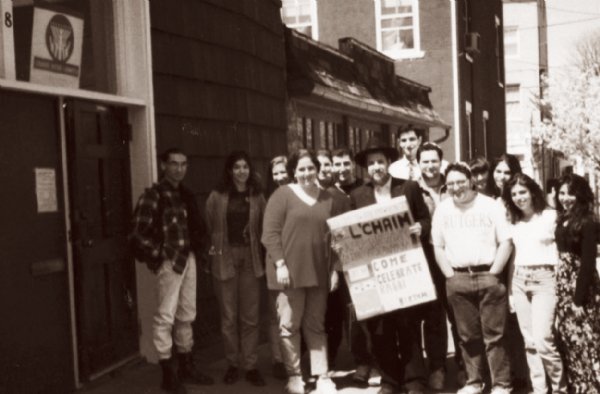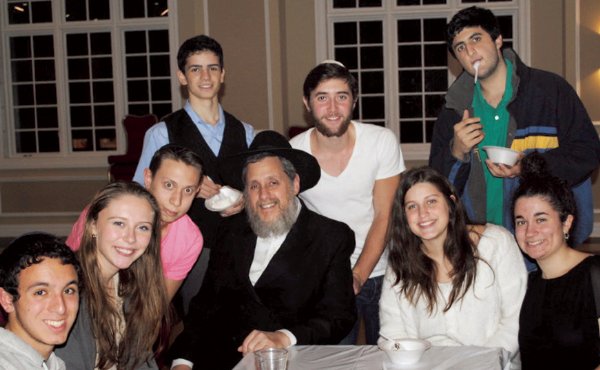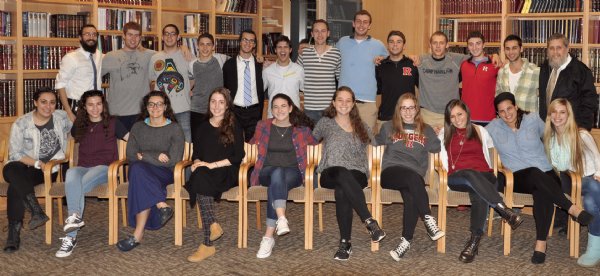|
(Click here for the original article printed in Jewish Link of New Jersey)
University classes often consider “case studies” as a way of illustrating and examining best practices, allowing students  to consider how theories in the classroom are reflected in real-world achievements. to consider how theories in the classroom are reflected in real-world achievements.
Students who seek a vivid example of an organization that has successfully cultivated a market, experienced steady and robust growth over four decades, and continuously demonstrated exceptional talents in engaging Jewish students meaningfully and joyfully in their Jewish heritage should take a close look at an icon on Rutgers University’s College Ave. Campus in New Brunswick—Chabad at Rutgers.
“Chabad House is an important part of Rutgers University,” said Rutgers University-New Brunswick Chancellor Deba Dutta. “One of the core principles of our university is diversity and inclusion, and Chabad enables Jewish students of all backgrounds to celebrate their faith in many different ways. We are grateful for their 40 years of service to the Rutgers community.”
In September, Chabad at Rutgers will mark its 40th year on the Rutgers New Brunswick campuses. Its story begins with the humblest of origins and reaches a pinnacle of success that is perhaps unparalleled anywhere else.
In September 1978, Rabbi Yosef Carlebach, very newly married and a newly minted Chabad shliach (emissary), was dispatched by the Lubavitcher Rebbe to set up a Chabad presence at Rutgers University and in Central New Jersey. Though Rabbi Carlebach had received invitations to lead Chabad’s efforts in Canada, South Africa or Rochester, New York, the Rebbe told him that New Jersey was ideally suited for him. And so, 10 days after their wedding, Rabbi Yosef and Rivkah Carlebach set off for New Jersey and moved into a small apartment on Cedar Lane in Highland Park.
 Rabbi Carlebach recalls that his mother gave him a wedding present of two folding chairs. He set their phone on one chair, he sat in the other, and Chabad at Rutgers got started. Rabbi Carlebach recalls that his mother gave him a wedding present of two folding chairs. He set their phone on one chair, he sat in the other, and Chabad at Rutgers got started.
Rabbi Yosef and Rivkah set up shop for Chabad in a rented room on the fourth floor of the Rutgers Student Center, offering Shabbat and holiday services. Rabbi Carlebach had to actively recruit students, one on one, to help make the minyan. He remembers with a smile how one student in the game room in the basement of the student center said he’d be upstairs right away, as soon as he finished the video game he was playing and his quarter ran out.
The young man made the minyan. And step by step, Chabad at Rutgers grew. In 1981 they purchased a property on Sicard Street, which became the home address for Chabad for a decade and a half. That same year they hired their first staff person, which further fueled the expansion of Chabad activities at Rutgers and across the region.
In the early 1990s, Chabad purchased the property of a now-closed Rutgers fraternity, Lambda Chi Alpha, at 170 College Ave. and began a $6 million fundraising campaign to build a much larger Chabad House. Donors responded generously, and in 1996 a large 35,000-square-foot facility opened. Named the Les Turchin Chabad House in honor of a generous lead gift from Les Turchin, owner of Tops Appliances, the space featured a well-appointed dorm for women, a dining room for a daily kosher meal plan, space for one of the largest sukkot in the area, and other attractions.
Five years later, the organization’s continued growth pointed to the need for an expansion of the Chabad House, and Rabbi Carlebach launched a new $15 million capital campaign. Chabad at Rutgers raised the funds to increase the footprint of the Chabad House to 90,000 square feet. The newly expanded building is now the largest Jewish student center in the world. It encompasses a large catering/social hall, two suites of well-furnished dorms that can collectively house 92 students, an Ashkenazi shul and a Sephardic shul (the first ever on a U.S. college campus), a large kitchen/dining area, an industrial-size kitchen and more.
Taking stock, Rabbi Carlebach is amazed at the remarkable growth of the organization over 40 years. He recalls starting out with a staff of two (he and his wife) and a budget of $17,000; today Chabad at Rutgers employs 22 people, most of whom are full-time staff, including five kitchen workers, and it manages an annual budget of $4 million. And it’s gone from struggling to make a minyan to serving 300-500 students each Shabbat.
The two jewels in the crown of Chabad at Rutgers are the dorms and the kosher meal plan. The well-appointed dorms, in separate wings of the building for men and women, feature apartment suites with private bathrooms and showers for each room, kitchen and self-serve laundry on each floor, and free WiFi and an exercise room in each wing. The Chabad at Rutgers dorms have rates that are competitive with off-campus housing costs (which offer fewer amenities) and offer a four-year package deal with declining costs each year.
The Chabad House kosher meal plan provides well-balanced breakfasts, lunches and dinners with a variety of options—including vegetarian alternatives—at all meals. The Chabad at Rutgers dining program is recognized by the university as an approved meal provider, enabling participants to comply with Rutgers’ meal plan obligation for students residing on campus.
Asked to comment on what factors have contributed most significantly to the growth of Chabad at Rutgers, Rabbi Carlebach spoke of the strong support and frequent guidance of the Rebbe; the warm partnership Rabbi Carlebach forged with the first major donor to Chabad at Rutgers, Les Turchin, and Turchin’s family and business associates; and the skills, commitment and personal warmth of the Chabad at Rutgers staff, headed by Rabbi Baruch and Sarah Goodman, Rabbi Shaya and Chaya Shagalow, and Rabbi Mendy and Chumi Carlebach. Rabbi Carlebach also stated that, as the Chabad building grew in size and services, yeshiva high schools in the area took note and advised their students to consider Rutgers as a kosher-friendly option.
Dr. Anne Arenson Winter, a parent of two students who attended Rutgers and frequented Chabad at Rutgers (Avi, class of 2014, and Rachel, class of 2015), identified one more critical factor that greatly influenced Chabad at Rutgers’ success. Quoted in the Chabad at Rutgers 2017/2018 annual report, Dr. Winter said: “Rabbi Carlebach’s integrity and dedication to the well being of Jewish students on campus is the reason why many Rutgers parents sleep well at night. Based on his siblings’ experiences, Rutgers is my go-to school and my 15-year-old son’s first choice for college.”
Lots of scenes and statistics can cogently illustrate the impact of Chabad at Rutgers over 40 years—the 1,000 current and potential students who celebrated Shabbat together at Chabad in March 2017, the 200-250 students who enjoy kosher meals at 170 College Ave. each day, the estimated 50,000 students touched directly by Chabad at Rutgers events since 1978, and countless others. Yet one of Rabbi Carlebach’s favorite memories features only two students.
As described in the dinner journal that marked Chabad at Rutgers’ 37th anniversary: “One Chanukah evening (in 2010), while making his usual after-hours tour of the building, Rabbi Carlebach noticed two young women in the dining room. He glanced at his watch to confirm the hour—1:30 a.m. Each was holding a shamash, slowly lighting the Chanukah candles. One was teaching the  other how to say the brachot. “In my wildest dreams,” he said to himself, “I never thought I would witness such miracles.” other how to say the brachot. “In my wildest dreams,” he said to himself, “I never thought I would witness such miracles.”
“Chabad at Rutgers has been there for my mother, myself and my sister,” said Micah Leibowitz, a 2018 Rutgers graduate. “Over my four years at RU, Chabad has provided me with stellar living accommodations, great food and a strong sense of community. Chabad at Rutgers has had a great 40-year run and should continue to be a positive force on campus for many decades to come!”
Author’s note: This article does not address the second half of Chabad at Rutgers’ far-reaching work—its remarkable impact on the Jewish communities and political scene in New Jersey. Please look for a companion article, focused on that facet of Chabad at Rutgers’ 40th anniversary, in a few weeks’ time in The Jewish Link of New Jersey.
By Harry Glazer
|

